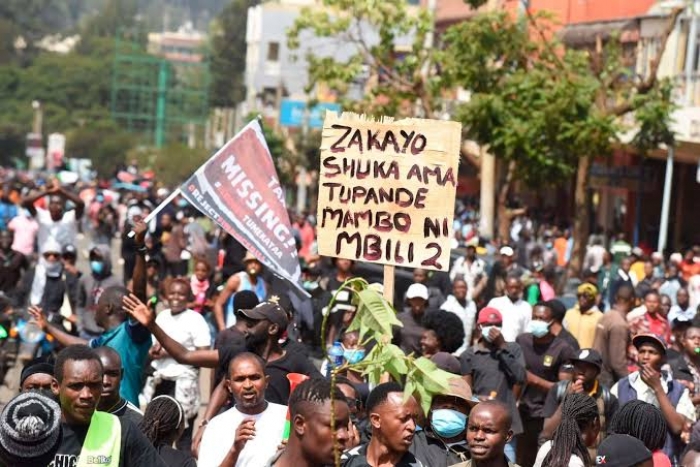For weeks Kenya has been mired in unrest. Confronted with demonstrators denouncing the tax policies of William Ruto, Kenya’s president, the security forces responded ruthlessly. They have killed at least 39 people, most of them in Nairobi on June 25th, when protesters briefly overran Parliament and set a portion of it ablaze. Looting has also erupted in several towns and cities, though it is unclear whether this was by state-backed provocateurs, as the protesters allege, or by opportunist criminals, as Ruto claims.
Yet far from provoking fear among Kenya’s better-off, the unrest has inspired wild optimism. Unlike most protests in recent decades, these are led by young, eloquent, educated Kenyans who are unsullied by political or tribal allegiance. Their cause—an end to corruption, injustice and inequality—seems noble rather than tawdry. Instead of championing a self-serving political leader or faction, they have denounced the entire political class. These protests have consequently united rather than polarised people. Perhaps the only parallel that can be drawn is with the protests led by the present lot’s parents, who also braved police bullets in 1990 to demand, successfully, an end to dictatorship and the restoration of multiparty elections.
The reverberations of the “Gen-Z protests”, as they are known in Kenya, could be as profound. Ruto has been weakened and humiliated. Could the chastening of the political class lead to a cleansing of corruption and fairer politics? Stung by the extent of the unrest, Ruto has capitulated on tax. Much will depend on whether Kenya’s people and its rulers can overcome the challenges and seize the opportunities created by past weeks’ events.
Ruto’s first task will be to find a way of getting Kenya to live within its means. He came to power in 2022 with an ambitious poverty-alleviating agenda yet inherited a wodge of debt from his free-spending predecessor. Faced with rising borrowing costs, a public debt equivalent to 68% of GDP, conditional IMF support and the expectations of his voters, Ruto had little choice but to put up taxes. The latest rise triggered the unrest, with protesters nicknaming the president “Zakayo”, the Kiswahili name for Zacchaeus, a biblical tax-collector.
Kenya is not the only country to suffer debt distress. But it seems to have a lower pain threshold than others on IMF lifelines, such as Pakistan, Egypt and Nigeria, notes Charlie Robertson of FIM Partners, who draws parallels with the Greek financial crisis of 2009. Like Greece, Kenya built up debt when borrowing was cheap and paid little heed to current-account and budget deficits. Now it is struggling to pay up.
Facing a $2.7bn hole in his budget this year after abandoning the tax increases, Ruto has to cut spending and raise borrowing. Kenya is likely to miss its target of cutting its fiscal deficit to 4.7% of gdp this year. Ruto also faces a potential mutiny from MPs who are enduring the fury of their constituents. “His legislative agenda is dead,” one says. “He is a lame duck.”
Ruto could possibly have avoided this pickle. While anger over his fiscal policy exists, the president’s tax rises became a tangible hook on which to hang more nebulous grievances, primarily over corruption and unemployment. Kenya’s young are more educated than ever before, but 67% of those under the age of 34 are not regularly employed.
Many are angry that while they struggle to survive, Ruto’s allies have flaunted their wealth. “The finance bill wasn’t the root cause of the protests,” says John Githongo, a former anti-corruption tsar. “The biggest grievance is the conspicuous consumption of the Ruto regime.”
Addressing corruption is where the real opportunity for change comes. MPs who supported the tax rises have had their offices, businesses and homes attacked. Congregations have walked out when some have tried to address church services. “We have become pariahs,” grumbles one lawmaker. MPs who used to swank about their wealth are now cultivating new images as humble servants of the people.
This is a start, but the protesters frequently demand two things. The first is to end a culture of nepotism in which cushy sinecures are bestowed on politicians’ relatives. Ruto has responded by scrapping state funding for his wife and slashing the number of special advisers whom cabinet ministers can appoint.
The second is to end community fundraising drives, known as harambees(Kiswahili for “let’s pull together”) because they incentivise political corruption. One of the reasons politicians flaunt their wealth, for example by arriving at rallies by helicopter, is to prove that they are rich enough to hand over bags of banknotes at these weekly events, as is commonly expected of them. (In March Ruto donated $389,000 to the Salvation Army.) Activists see these donations as little more than a tax on corruption, with politicians encouraged to steal in order to return a portion of their ill-gotten gains to the public.
On July 5th Ruto banned public officials from taking part in harambees. Whether that will last is another question. One county governor predicts that the ban will begin to unravel by the end of the school holidays in August, when harambees are called to provide bursaries for pupils whose parents cannot afford fees.
The biblical Zacchaeus was redeemed by climbing down from the tree from which he could view Jesus and giving half his money to the poor. Kenyans would rather Ruto and his colleagues stopped giving cash away and instead prevented officials from stealing it in the first place. If he heeds their call, he may yet survive.

































































